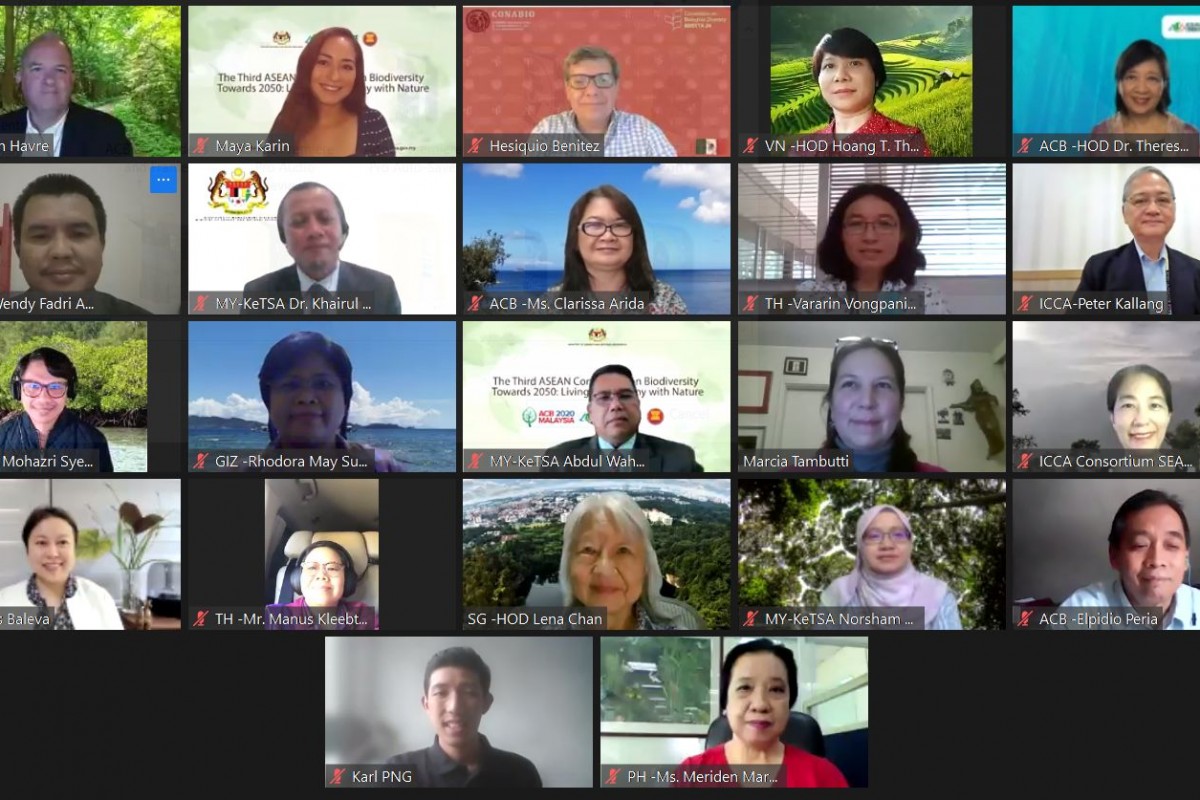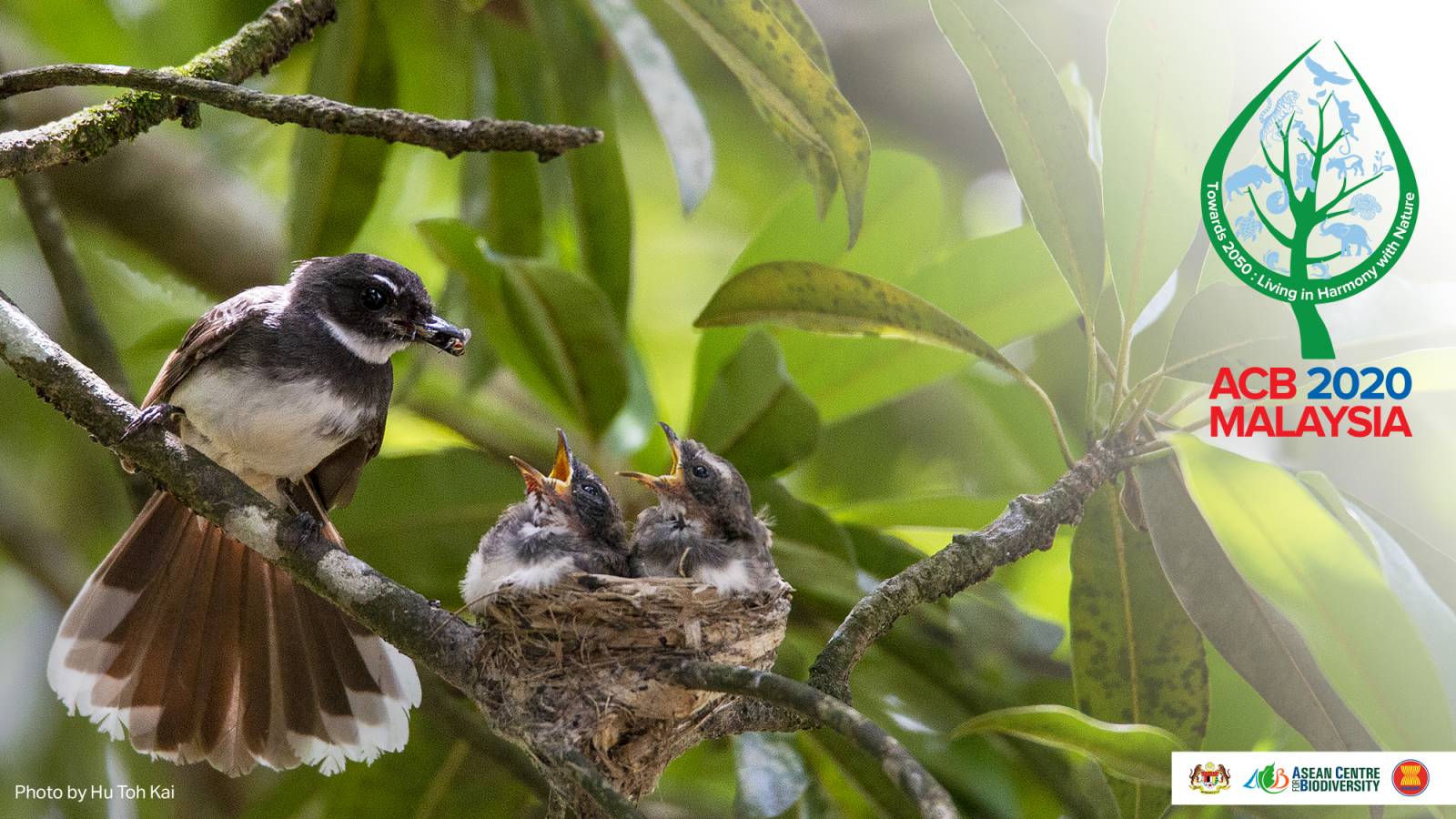LAGUNA -- The Ministry of Energy and Natural Resources (KeTSA) of Malaysia and the ASEAN Centre for Biodiversity (ACB) concluded the Third ASEAN Conference on Biodiversity, which was held online amid restrictions due to the COVID-19 pandemic.
The closing event of the conference gathered more than 700 participants from across the ASEAN region via Zoom on 5 July 2021, many of whom were representatives from government agencies of the member states. With the theme “Towards 2050: Living in Harmony with Nature, the event was likewise live-streamed on Facebook.
In his message, ASEAN Secretary-General H.E. Dato Lim Jock Hoi said future actions must focus on further promoting greener investments, nature-based solutions, and more socially responsible practices.
“The next five years presents a solid ground and I am optimistic that our biodiversity mission will be sustained,” Dato Lim Jock Hoi said citing initiatives in the region, such as the Biodiversity Conservation and Management of Protected Areas in ASEAN (BCAMP), the ASEAN Heritage Parks Programme, and the soon-to-be launched ASEAN Green Initiative.
“These demonstrate our resolve to reduce the loss of habitats and wildlife, as well as to conserve and ensure the integrity of ecosystems in the region. All these can only be achieved if all of us continue to work together in protecting our ecosystems and biological resources.”
Welcoming participants, H.E. Datuk Seri Dr. Shamsul Anuar Bin Nasarah, Minister of Energy and Natural Resources of Malaysia, said the conference sought to promote biodiversity conservation in the region and strengthen the ASEAN Member States’ position to the upcoming 15th Conference of Parties (COP15) to the Convention on Biological Diversity (CBD).
“Malaysia continues to make advances towards fulfilling its share in the global commitment on protecting biodiversity by taking comprehensive measures to ensure that the country’s economic development does not sacrifice its biodiversity, rather have it go hand in hand,” the minister said.
The conference was originally scheduled for March 2020 in Kuala Lumpur, Malaysia but it was postponed and later restructured to a virtual format due to concerns over the COVID-19 pandemic.
From September to December 2020, four sub-conferences on themes such as the post-2020 global biodiversity framework, mainstreaming biodiversity, transformative change and innovations, and business and biodiversity have been convened online.
“Integrated and synergistic approaches towards recovery and progress are possible with multi-stakeholder participation where sectors, from the public to the private, from small communities to huge industries, can put nature and biodiversity at the core of economic and development plans,” ACB Executive Director Theresa Mundita Lim said in her opening remarks.
Ambitious, realistic framework
Officials of the ASEAN Member States and representatives of the private sector and civil society organisations delivered their interventions and positions on the post-2020 global biodiversity framework.
Some member states expressed hope for an ambitious but realistic framework that can be translated into concrete actions.
Lao PDR highlighted the need to increase the technical assistance to least developed and developing countries and set a clear provision of new and additional financial resources, including through the CBD’s financial mechanism.
Singapore recommended protecting the diversity of ecosystems, reducing carbon emissions, restoring natural ecosystems, innovation in science and technology, and everyone’s involvement in the efforts to implement the post-2020 GBF.
Thailand highlighted mainstreaming biodiversity in key development sectors, including agriculture, fisheries, energy, manufacture, infrastructure, and tourism to address the drivers of biodiversity loss and apply best practices on sustainable use.
Indonesia emphasised the importance of mainstreaming biodiversity and involvement of all stakeholders, highlighting principles of justice in access and benefit-sharing for local communities.
Brunei Darussalam said nature-based solutions must be part of the approach in strategic planning and at the core of further enhancing the resilience to face present and future challenges.

Keynote messages
The conference featured key messages on updates from the discussion related to the development of the post-2020 global biodiversity framework by Basile van Havre, co-Chair of the Open-Ended Working Group on the post-2020 global biodiversity framework of the CBD, and by Hesiquio Benitez Diaz, current chair of the Subsidiary Body on Scientific, Technical and Technological Advice (SBSTTA).
ASEAN Deputy Secretary-General for ASEAN Socio-Cultural Community Kung Phoak shared the post-pandemic recovery plans of the region, highlighting the implementation of the ASEAN Comprehensive Recovery Framework.
Speaking on the experiences of The Group of Latin America and Caribbean Countries, or GRULAC, Marcia Tambutti, a biodiversity expert at the United Nations Economic Commission for Latin America and the Caribbean (ECLAC), shared examples of initiatives mainstreaming biodiversity in fisheries, vineyards, forestry, agriculture, tourism, and finance, which resulted in a return on investment in economic, social and environmental terms.
United Kingdom Ambassador to the ASEAN Jon Lambe talked about the synergies among global commitments to protect nature in his keynote message, highlighting the importance of linking efforts to fight climate change and reverse biodiversity loss.
Meanwhile, Professor Emerita Dato’ Seri Dr. Mazlan Othman of the International Science Council of the Regional Office for Asia and the Pacific explained the importance of scenario building in exploring possibilities for the future and assessing present reactive and proactive actions. She talked about how the Sustainable Development Goals can be achieved through biodiversity and ecosystems, which at present have an estimated value of USD 33 trillion.
The conference was supported by the European Union through the Biodiversity Conservation and Management of Protected Areas in ASEAN (BCAMP) project, the Federal Government of Germany through KfW and GIZ, and the Secretariat of the Convention on Biological Diversity.
Singer and actress Maya Karin and Mr. Abdul Wahid Bin Abu Salim, deputy secretary-general of KeTSA, moderated the closing session.
Details of the conference sessions are available at the conference website: acb2020.aseanbiodiversity.org and the recorded live-stream of the sessions may be accessed on the ACB’s Facebook page. (ACB)



